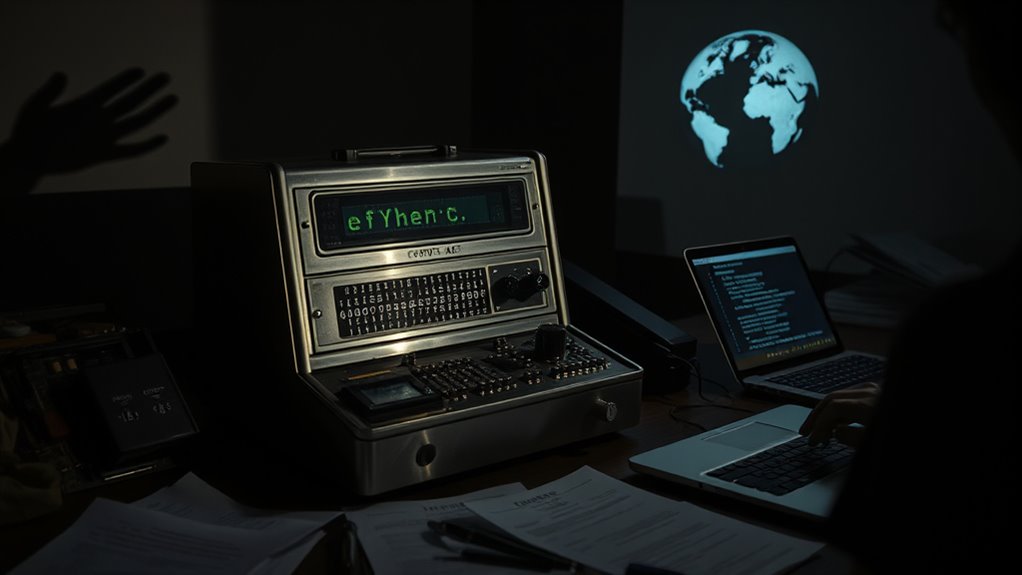Operation Rubicon, a secret partnership between the CIA and BND, manipulated encryption technology through Crypto AG to enable spying on over 120 nations. By embedding vulnerabilities in devices, they tapped into sensitive communications without countries realizing it. This operation not only influenced global intelligence dynamics but also set a precedent for modern AI surveillance methods. You'll uncover how these historical actions continue to shape today's cryptographic practices and intelligence operations as you explore further.
Key Takeaways
- Operation Rubicon demonstrated how manipulating encryption technology can lead to widespread surveillance, setting a precedent for future AI-driven espionage tactics.
- The collaboration between CIA and BND in exploiting vulnerabilities in Crypto AG's devices laid the groundwork for integrating AI in intelligence operations.
- Access to sensitive communications from numerous countries illustrated the potential for AI to analyze large datasets for intelligence gathering.
- The ethical concerns raised by Operation Rubicon highlight the need for responsible AI use in surveillance and data privacy considerations.
- Lessons learned from Crypto AG's manipulation inform current AI cryptographic practices, emphasizing the balance between security and privacy rights.
The Origins of Operation Rubicon

While many people mightn't realize it, Operation Rubicon traces its roots back to the 1950s when the CIA and the BND first joined forces to exploit weaknesses in encryption technology.
Initially known as Operation Thesaurus, this collaboration formalized a licensing agreement that allowed these agencies to control Crypto AG, a Swiss encryption firm.
In 1970, they jointly purchased Crypto AG, aiming to manipulate encryption devices for authorized interception while maintaining an illusion of security for clients.
By the late 1980s, the CIA fully controlled Crypto AG operations, selling modified cipher devices to over 120 countries during the Cold War.
This strategic operation profoundly impacted global intelligence, providing critical insights into military and diplomatic communications.
The Role of Crypto AG in Global Espionage

Crypto AG played a vital role in global espionage by providing manipulated encryption technology to over 120 countries.
This not only influenced the global market but also forged powerful espionage partnerships, allowing the CIA and BND to monitor sensitive communications.
As we explore their impact, consider how these tactics shaped international relations and intelligence operations.
Manipulated Encryption Technology
In a covert operation that reshaped global espionage, a Swiss firm played a pivotal role in manipulating encryption technology to serve intelligence interests.
Crypto AG, under the control of the CIA and BND, provided rigged encryption devices that allowed intelligence agencies to intercept and decrypt communications across over 120 countries. This manipulation gave governments a false sense of security while enabling extensive surveillance on military and diplomatic communications.
Operation Rubicon, which evolved from an earlier initiative called Thesaurus, facilitated critical insights into global events, influencing U.S. foreign policy.
Global Market Influence
Though many nations believed they were securing their communications, the reality was that they were unknowingly entrusting their secrets to a Swiss firm controlled by the CIA and BND.
Crypto AG's encryption devices became essential tools for foreign governments, including Iran and Iraq, during the Cold War.
Operation Rubicon turned out to be an intelligence coup, providing the CIA with invaluable insights that shaped global diplomacy.
By rigging these devices, they facilitated surveillance on their own allies, undermining trust in international relations.
As foreign governments funded their own surveillance efforts, the global market influence of Crypto AG drastically shifted, revealing a hidden layer of espionage that reshaped security protocols and intelligence operations worldwide.
Espionage Partnerships Formed
While many nations sought advanced encryption to protect their communications, they unwittingly became players in a vast espionage game orchestrated by the CIA and BND through their covert ownership of Crypto AG. The manipulation of encryption devices allowed these intelligence agencies to intercept sensitive communications across the globe, shaping geopolitical landscapes.
| Country | Espionage Impact | Encryption Device Used |
|---|---|---|
| Iran | Military strategy insights | Crypto AG Model X-123 |
| Iraq | Diplomatic secrets | Crypto AG Model Y-456 |
| Vatican | Religious communications | Crypto AG Model Z-789 |
| Chile | Overthrow of government | Crypto AG Model A-321 |
| Suez Canal | Crisis management intelligence | Crypto AG Model B-654 |
Through Operation Rubicon, Crypto AG fundamentally altered the trust in encryption technology, exposing ethical dilemmas in international relations.
Manipulation of Cipher Technology

When you think about Operation Rubicon, it's vital to recognize how cipher technology was compromised.
The CIA and BND didn't just sell secure devices; they embedded vulnerabilities to exploit communications from client nations.
This manipulation not only facilitated espionage but also raised serious ethical concerns about security in technology.
Cipher Technology Compromise
As intelligence agencies sought new ways to gain an edge, Operation Rubicon showcased a dramatic shift in how cipher technology was compromised. The CIA and BND manipulated encryption devices from Crypto AG to guarantee they appeared secure while allowing unauthorized interception. This clever ruse compromised communications for over 120 countries, enhancing U.S. intelligence capabilities greatly. The operational strategy favored embedding flaws within encryption devices, a departure from traditional code-breaking methods.
| Agency | Role |
|---|---|
| CIA | Manipulated cipher tech |
| BND | Partnered in espionage |
| Crypto AG | Produced compromised devices |
| Countries | Over 120 affected |
Espionage-Driven Modifications
Through the covert manipulation of cipher technology, intelligence agencies like the CIA and BND turned ordinary encryption devices into tools of espionage.
Operation Rubicon saw the introduction of espionage-driven modifications in Crypto AG's manipulated cipher devices, allowing these agencies to intercept encrypted communications from over 120 countries, including those in the global south.
The CX-52 model, designed to appear secure, actually provided intelligence access to sensitive diplomatic and military messages.
This manipulation raised significant ethical concerns, as it compromised the trust of nations relying on these machines for security.
Security Vulnerabilities Exploited
The covert manipulation of cipher technology not only compromised the trust of nations but also exposed significant security vulnerabilities. Operation Rubicon, a collaboration between the CIA and BND, allowed these intelligence agencies to exploit Crypto AG's encryption devices. This covert operation enabled them to intercept and decrypt communications, impacting over 120 countries.
| Intelligence Agency | Targeted Countries | Impact on Signals Intelligence |
|---|---|---|
| CIA | Iran, Iraq | Gained insights into military operations |
| BND | Argentina | Monitored diplomatic communications |
| Both | Worldwide | Accessed 40% of NSA's decryption capability |
Geopolitical Implications and Targets

While many may see Operation Rubicon as a mere intelligence operation, its geopolitical implications were profound and far-reaching.
By manipulating Crypto AG's encryption devices, U.S. and West German intelligence services gained access to sensitive communications from around 100 countries, including nuclear powers like India and Pakistan.
This operation notably shaped U.S. foreign policy, providing critical insights during the Cold War and influencing military strategies against espionage targets such as Iran, Iraq, and Libya.
The extensive reach of Operation Rubicon not only secured strategic advantages for the U.S. and its allies, but also raised ethical concerns regarding trust in intelligence operations and their impact on global diplomacy.
The operation transformed geopolitical dynamics, allowing anticipation of adversarial actions effectively.
Ethical Concerns and Public Awareness

As revelations about Operation Rubicon emerged, people began grappling with the ethical implications of espionage practices that undermined trust among nations.
The manipulation of encryption devices by Crypto AG raised significant ethical concerns, leading to widespread surveillance of foreign governments without their knowledge. Investigative reports spotlighted how intelligence agencies exploited these vulnerabilities, prompting a surge in public awareness around accountability and transparency.
This operation sparked discussions about the reliability of privacy assurances from technology companies, especially as AI capabilities grow.
As the Swiss government launched an investigation into Crypto AG, it reflected a critical need for ethical discourse on surveillance and the responsibilities of intelligence agencies to uphold trust in international alliances.
Legacy and Impact on Modern Intelligence Practices

Operation Rubicon fundamentally reshaped modern intelligence practices by exposing vulnerabilities in encryption technologies that intelligence agencies continue to exploit.
The operation's legacy includes:
- A heightened focus on algorithmic security, as nations develop secure communication methods to counter espionage threats.
- Increased scrutiny and regulatory action surrounding privacy rights, pressing for ethical considerations in intelligence operations.
- A shift in geopolitical decisions, with intelligence gathered influencing critical outcomes and strategies globally.
As a result, trust in encryption solutions has eroded, prompting debates on the balance between national security and individual privacy rights.
This legacy of distrust continues to inform modern cryptographic practices, ensuring that the lessons learned from Operation Rubicon resonate through today's intelligence landscape.
Frequently Asked Questions
What Specific Technologies Did Crypto AG Use for Encryption?
Crypto AG used a range of advanced technologies for encryption, including mechanical cipher machines, electronic encryption devices, and later, microprocessor-based systems.
You'd find their products featured polyalphabetic ciphers and stream ciphers, designed to secure communications effectively. They also implemented various key management techniques to enhance security.
These technologies made their encryption systems highly sought after by governments and organizations, ensuring confidential communications remained protected from unauthorized access.
How Did Countries React Upon Discovering Operation Rubicon?
When countries caught wind of Operation Rubicon, shock swiftly spread. Some nations expressed outrage, feeling betrayed by the breach of trust.
Others scrambled to reassess their security strategies, seeking to strengthen their defenses against future espionage. Many leaders launched investigations, while intelligence agencies reevaluated their reliance on foreign technology.
The revelation ignited debates about ethics in intelligence, prompting a push for transparency and accountability in international espionage practices.
Were There Any Whistleblowers Involved in Exposing the Operation?
Yes, there were whistleblowers involved in exposing this operation.
You might find that these individuals played a significant role in revealing the truth behind the secretive dealings, often risking their careers and safety.
They provided essential information that shed light on unethical practices, sparking public outrage and prompting investigations.
Their bravery in speaking out highlights the importance of transparency and accountability in government and corporate actions, which you may find inspiring.
What Lessons Can Current Intelligence Agencies Learn From Operation Rubicon?
Current intelligence agencies can learn essential lessons from past operations like Rubicon.
First, transparency and accountability are important; trust erodes quickly when secrets surface.
Embrace modern technology, but don't forget ethical implications—your tools should enhance security, not compromise it.
Finally, foster a culture where whistleblowers feel safe to speak up.
Just like social media can amplify voices today, so can courageous individuals expose misdeeds and protect the integrity of national security.
How Has Public Perception of Surveillance Changed Since Operation Rubicon?
Public perception of surveillance has shifted considerably.
You're more aware of the balance between security and privacy, recognizing how technology can invade personal space.
With recent revelations, you might feel a mix of skepticism and acceptance; while some believe surveillance is necessary for safety, others worry about government overreach.
This awareness has sparked debates about transparency, accountability, and the ethical implications of surveillance, leading to calls for reform in how agencies operate.
Conclusion
In understanding Operation Rubicon, you see the intricate dance of technology and espionage, the manipulation of ciphers and secrets, the blurred lines of ethics and power. You recognize the lasting legacy it leaves on intelligence practices, the lessons it teaches about trust and betrayal, the shadow it casts over the future of AI in surveillance. As you reflect, you grasp the importance of vigilance, the necessity of transparency, and the responsibility that comes with wielding such powerful tools.








